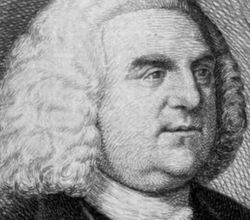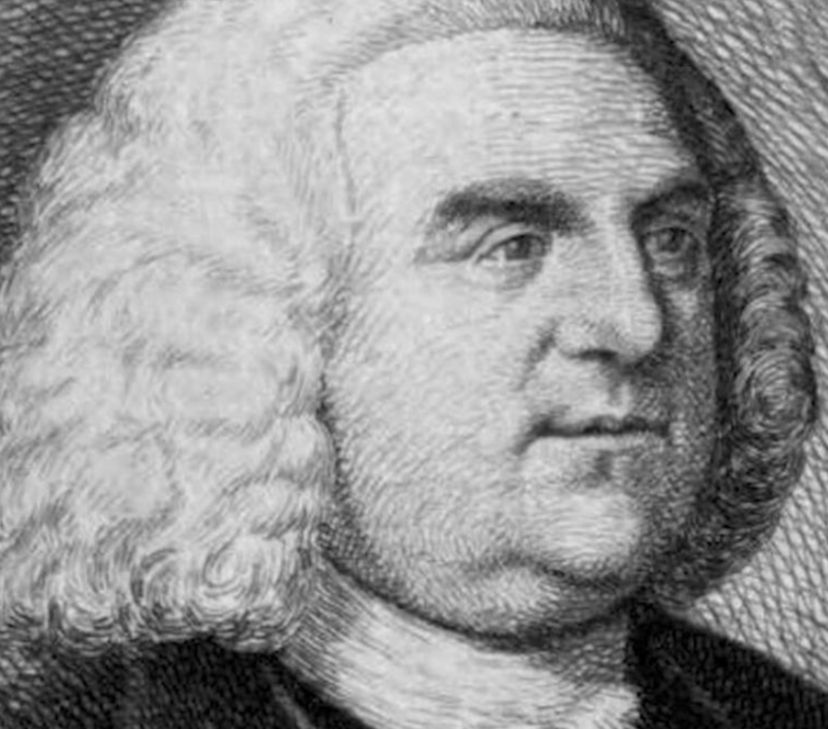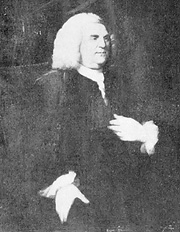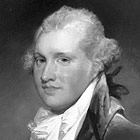William Allen, Sr. was born about 1670 in Ireland, perhaps county Tyrone, a son of John Allen and unknown Craige.
William Allen, Sr. married about 1700 to Mary Budd, daughter of Thomas and Susanna Budd, a sister of Rose Budd, who daughter Sarah Plumley married Edward Shippen of Lancaster, PA.
William Allen, Sr. was a successful Philadelphia merchant of Scots-Irish descent, who had immigrated to America from Dungannon, County Tyrone, Ireland, with his brother, John, and father. The elder Allen had risen to prominence through close ties to William Penn, the proprietor of Pennsylvania.
William Allen, Sr. was in partnership with Joseph Allen. Joseph Turner (1701–1783) was a seaman, merchant, iron manufacturer, and politician in colonial and post-colonial Philadelphia, Pennsylvania.
Joseph Turner was born in 1701 in Hampshire, England. He came to America in January 1714. Early Philadelphia records identify him as a sea captain in 1724 and a businessman in 1726. For many decades prior to the American Revolution, he was in business with Chief Justice William Allen; their firm, Allen & Turner, was one of the most important in the colonies. Turner entered into trade agreements and iron mining and manufacture ventures, including the Union Iron Works in Hunterdon County, New Jersey, at present-day High Bridge, New Jersey.[1] With Allen and others, Turner participated in the importation and trade of slaves, which was then legal.
He died 25 Aug 1725 in Philadelphia, aged 55 yrs, a native of Ireland as he mentions in his will his sister Catharine Cally, living at Dungannon, Ireland and his uncle William Craige.
William Allen, Jr. was a graduate of Cambridge University's Clare College. At his father's death in 1725, Allen inherited his father's merchant firm of Allen & Turner. Turner was Captain Joseph Turner, who captained the brig Lively, the firm's merchant vessel. Occasionally among its cargo were enslaved people brought from the West Indies to Philadelphia.
Before the Revolutionary War, Allen held many public offices, including city councilman, mayor, city recorder, and provincial assemblyman. Additionally, he was favored by the proprietors with a number of judicial appointments, including judge of the Orphans' Court and Common Pleas as well as Chief-Justice of the Supreme Court.
During the war with Spain, when he headed the Anti-Quaker party, he vied with Isaac Norris the younger for a seat in Pennsylvania's provincial Assembly; during this 1742 election he barely cleared himself of responsibility for the rioting that occurred.
A Loyalist, William Allen, Jr. agreed that the colonies should seek to redress their grievances with British Parliament through constitutional means, and he disapproved of the movement toward independence.
He built a manor and country estate, known as Mount Airy, in 1750 outside Philadelphia; the neighborhood became known by his estate's name and is now part of the city. In 1762 he founded what became Allentown, Pennsylvania, and had a hunting lodge there.
In early disputes between the colonies and their mother country, he sided strongly with the colonists. In spite of that, he was opposed to the Declaration of Independence, and after its passage he retired from public life to return to England. In 1779 he revisited Philadelphia and, by adding a codicil to his will, freed his slaves at his death the following year.
SOURCES: University of Pennsylvania Archives.
Matriculates, Dictionary of American Biography, American National Biography, University of Pennsylvania 1740-1900, Alumni Record
History's Headlines, Frank Wehlan
William Allen, Sr. was born about 1670 in Ireland, perhaps county Tyrone, a son of John Allen and unknown Craige.
William Allen, Sr. married about 1700 to Mary Budd, daughter of Thomas and Susanna Budd, a sister of Rose Budd, who daughter Sarah Plumley married Edward Shippen of Lancaster, PA.
William Allen, Sr. was a successful Philadelphia merchant of Scots-Irish descent, who had immigrated to America from Dungannon, County Tyrone, Ireland, with his brother, John, and father. The elder Allen had risen to prominence through close ties to William Penn, the proprietor of Pennsylvania.
William Allen, Sr. was in partnership with Joseph Allen. Joseph Turner (1701–1783) was a seaman, merchant, iron manufacturer, and politician in colonial and post-colonial Philadelphia, Pennsylvania.
Joseph Turner was born in 1701 in Hampshire, England. He came to America in January 1714. Early Philadelphia records identify him as a sea captain in 1724 and a businessman in 1726. For many decades prior to the American Revolution, he was in business with Chief Justice William Allen; their firm, Allen & Turner, was one of the most important in the colonies. Turner entered into trade agreements and iron mining and manufacture ventures, including the Union Iron Works in Hunterdon County, New Jersey, at present-day High Bridge, New Jersey.[1] With Allen and others, Turner participated in the importation and trade of slaves, which was then legal.
He died 25 Aug 1725 in Philadelphia, aged 55 yrs, a native of Ireland as he mentions in his will his sister Catharine Cally, living at Dungannon, Ireland and his uncle William Craige.
William Allen, Jr. was a graduate of Cambridge University's Clare College. At his father's death in 1725, Allen inherited his father's merchant firm of Allen & Turner. Turner was Captain Joseph Turner, who captained the brig Lively, the firm's merchant vessel. Occasionally among its cargo were enslaved people brought from the West Indies to Philadelphia.
Before the Revolutionary War, Allen held many public offices, including city councilman, mayor, city recorder, and provincial assemblyman. Additionally, he was favored by the proprietors with a number of judicial appointments, including judge of the Orphans' Court and Common Pleas as well as Chief-Justice of the Supreme Court.
During the war with Spain, when he headed the Anti-Quaker party, he vied with Isaac Norris the younger for a seat in Pennsylvania's provincial Assembly; during this 1742 election he barely cleared himself of responsibility for the rioting that occurred.
A Loyalist, William Allen, Jr. agreed that the colonies should seek to redress their grievances with British Parliament through constitutional means, and he disapproved of the movement toward independence.
He built a manor and country estate, known as Mount Airy, in 1750 outside Philadelphia; the neighborhood became known by his estate's name and is now part of the city. In 1762 he founded what became Allentown, Pennsylvania, and had a hunting lodge there.
In early disputes between the colonies and their mother country, he sided strongly with the colonists. In spite of that, he was opposed to the Declaration of Independence, and after its passage he retired from public life to return to England. In 1779 he revisited Philadelphia and, by adding a codicil to his will, freed his slaves at his death the following year.
SOURCES: University of Pennsylvania Archives.
Matriculates, Dictionary of American Biography, American National Biography, University of Pennsylvania 1740-1900, Alumni Record
History's Headlines, Frank Wehlan
Family Members
Advertisement
Records on Ancestry
Sponsored by Ancestry
Advertisement






